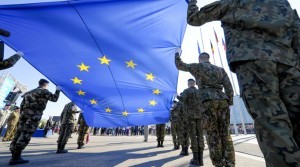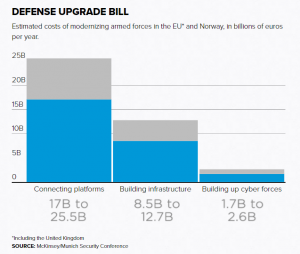Europe will need to spend up to €41 billion annually in the coming years to modernize its military forces for increasingly digitized warfare, according to analysis by defense policy experts.
The report by the Munich Security Conference, supported by consulting firm McKinsey and Berlin-based Hertie School of Governance, says the lion’s share of the money would have to be spent on efforts to better connect weapons systems. That would include upgrading software and hardware and increasing bandwidth to make sure that, even in remote areas, troops are not cut off from weapons systems driven by digital networks.
The analysis, due to be published next week, estimates the EU’s 28 member countries (including the U.K.) plus Norway need to invest between €27.2 billion and €40.8 billion per year over the course of the next five to seven years.
Money should also flow into the creation of joint centers to analyze data and into hiring more cyber experts to defend digital infrastructure from attacks, the analysts state.
“While accurate numbers are hard to come by … we estimate that there are currently some 2,500 to 3,500 cyberwarriors in the European forces,” the report says, noting that “this is only half the size of the US Cyber Command, despite Europe and the US facing a similar cyber threat environment.”
The report comes against the backdrop of an imminent boom in military spending in Europe. EU countries are increasingly worried by Russian military assertiveness and European NATO allies have come under heavy pressure from U.S. President Donald Trump to bear more of the cost of defending the Continent.
The Trump administration has called on all NATO members to meet the goal of spending 2 percent of their GDP on defense.
The Munich Security Conference analysts estimate that €97 billion “of additional funds for defense would be available annually if all European countries reached the 2 percent goal by 2024, the equivalent of two times the UK’s 2017 defense budget.”
This would provide enough money to meet the additional cost of making forces fit for war in an age of big data and artificial intelligence, they say.
However, in a reference to skepticism among many NATO allies about the merits of boosting their military spending, they add that they are “well aware that, while countries will likely move in that direction [of reaching the 2 percent goal,] not all of them will in fact reach it.”
Source: politico.eu
Ask me anything
Explore related questions






